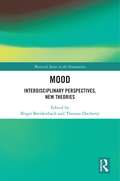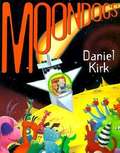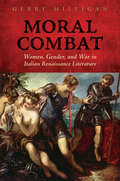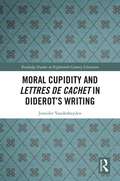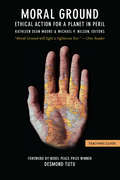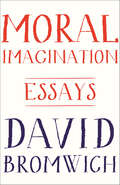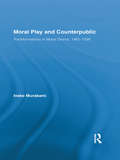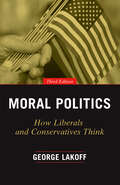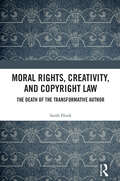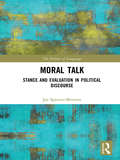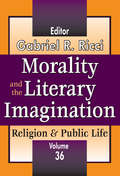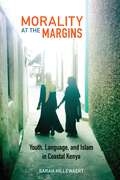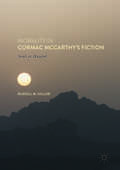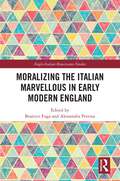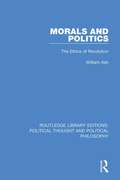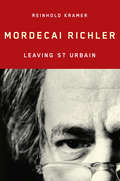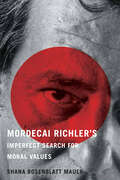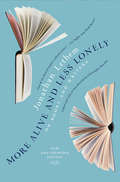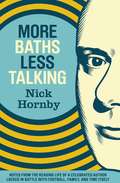- Table View
- List View
Mood: Interdisciplinary Perspectives, New Theories (Warwick Series in the Humanities)
by Thomas Docherty Birgit BreidenbachMood is a phenomenon whose study is inherently interdisciplinary. While it has remained resistant to theorisation, it nonetheless has a substantial influence on art, politics and society. Since its practical omnipresence in every-day life renders it one of the most significant aspects of affect studies, it has garnered an increasing amount of critical attention in a number of disciplines across the humanities, sciences and social sciences in the past two decades. Mood: Aesthetics, Psychology, Philosophy provides a comprehensive theoretical and empirical exploration of the phenomenon of mood from an interdisciplinary angle. Building on cutting-edge research in this emerging field and bringing together established and new voices, it bridges the existing disciplinary gap in the study of mood and further consolidates this phenomenon as a crucial concept in disciplinary and interdisciplinary study. By combining perspectives and concepts from the literary studies, philosophy, musicology, the social sciences, artistic practice and psychology, the volume does the complexity and richness of mood-related phenomena justice and benefits from the latent connections and synergies in different disciplinary approaches to the study of mood.
Moondogs
by Daniel KirkThere are amazing-looking dogs on the moon! Young Willy knows because he has been watching them through his telescope. When his dad suggests he ought to have a pet, Willy builds a rocket just his size, and sets off on the adventure of a lifetime. Willy's heart is set on finding a dog like you've never seen before and readers will be surprised to see what he brings home!
Moral Authority, Men of Science, and the Victorian Novel
by Anne DewittNineteenth-century men of science aligned scientific practice with moral excellence as part of an endeavor to secure cultural authority for their discipline. Anne DeWitt examines how novelists from Elizabeth Gaskell to H. G. Wells responded to this alignment. Revising the widespread assumption that Victorian science and literature were part of one culture, she argues that the professionalization of science prompted novelists to deny that science offered widely accessible moral benefits. Instead, they represented the narrow aspirations of the professional as morally detrimental while they asserted that moral concerns were the novel's own domain of professional expertise. This book draws on works of natural theology, popular lectures, and debates from the pages of periodicals to delineate changes in the status of science and to show how both familiar and neglected works of Victorian fiction sought to redefine the relationship between science and the novel.
Moral Combat: Women, Gender, and War in Italian Renaissance Literature (Toronto Italian Studies)
by Gerry MilliganThe Italian sixteenth century offers the first sustained discussion of women’s militarism since antiquity. Across a variety of genres, male and female writers raised questions about women’s right and ability to fight in combat. Treatise literature engaged scientific, religious, and cultural discourses about women’s virtues, while epic poetry and biographical literature famously featured examples of women as soldiers, commanders, observers, and victims of war. Moral Combat asks how and why women’s militarism became one of the central discourses of this age. Gerry Milligan discusses the armed heroines of biography and epic within the context of contemporary debates over women’s combat abilities and men’s martial obligations. Women are frequently described as fighting because men have failed their masculine duty. A woman’s prowess at arms was asserted to be a cultural symptom of men’s shortcomings. Moral Combat ultimately argues that the popularity of the warrior woman in sixteenth-century Italian literature was due to her dual function of shame and praise: calling men to action and signaling potential victory to a disempowered people.
Moral Cupidity and Lettres de cachet in Diderot’s Writing (Routledge Studies in Eighteenth-Century Literature)
by Jennifer VanderheydenThis volume explores the influence of the lettre de cachet on both Diderot’s personal life and his works, beginning with an examination of Diderot’s experience as recipient of two such arrest warrants, followed by an analysis of his references to these warrants in three of his fictional works, Le Père de famille, Jacques le fataliste and Est-il bon? Est-il méchant?. A scrutiny of Diderot’s mémoire/lettre novel La Religieuse proposes that, on the basis of moral cupidity, or self-gain, Madame Simonin sends her daughter Suzanne two veiled lettres de cachet that demand her confinement to a convent. The exploration of a fascinating real-life case of Henriette-Émilie de Bautru, a young comtesse whose mother confined her to a convent as a result of a lettre de cachet also based on motives of greed, leads to an examination of the similarities between Suzanne and the Comtesse in terms of their illegitimacy, questioning of authority and subsequent rebellion. A consideration of writing and communication in La Religieuse as they relate to this rebellion leads to an investigation of Diderot’s admiration of the mystery of female genius and artistic creativity as discussed in his essay Sur les femmes. The works of Julia Kristeva, especially her Post-Scriptum addressed to Diderot at the end of her work Thérèse mon amour: Thérèse d’Avila, serve as a theoretical basis for an interpretation of Suzanne’s experience as victim of a lettre de cachet and her search for a psychological rebirth of her être caché.
Moral Ground: Teaching Guide
by Kathleen Dean Moore Michael P. NelsonA Teaching and Study Guide for Moral Ground: Ethical Action for a Planet in Peril
Moral Imagination: Essays
by David BromwichCompelling essays from one of today's most esteemed cultural criticsSpanning many historical and literary contexts, Moral Imagination brings together a dozen recent essays by one of America's premier cultural critics. David Bromwich explores the importance of imagination and sympathy to suggest how these faculties may illuminate the motives of human action and the reality of justice. These wide-ranging essays address thinkers and topics from Gandhi and Martin Luther King on nonviolent resistance, to the dangers of identity politics, to the psychology of the heroes of classic American literature.Bromwich demonstrates that moral imagination allows us to judge the right and wrong of actions apart from any benefit to ourselves, and he argues that this ability is an innate individual strength, rather than a socially conditioned habit. Political topics addressed here include Edmund Burke and Richard Price's efforts to define patriotism in the first year of the French Revolution, Abraham Lincoln’s principled work of persuasion against slavery in the 1850s, the erosion of privacy in America under the influence of social media, and the use of euphemism to shade and anesthetize reactions to the global war on terror. Throughout, Bromwich considers the relationship between language and power, and the insights language may offer into the corruptions of power.Moral Imagination captures the singular voice of one of the most forceful thinkers working in America today.
Moral Play and Counterpublic (Routledge Studies in Renaissance Literature and Culture)
by Ineke MurakamiIn this study, Murakami overturns the misconception that popular English morality plays were simple medieval vehicles for disseminating conservative religious doctrine. On the contrary, Murakami finds that moral drama came into its own in the sixteenth century as a method for challenging normative views on ethics, economics, social rank, and political obligation. From its inception in itinerate troupe productions of the late fifteenth century, "moral play" served not as a cloistered form, but as a volatile public forum. This book demonstrates how the genre’s apparently inert conventions—from allegorical characters to the battle between good and evil for Mankind’s soul—veiled critical explorations of topical issues. Through close analysis of plays representing key moments of formal and ideological innovation from 1465 to 1599, Murakami makes a new argument for what is at stake in the much-discussed anxiety around the entwined social practices of professional theater and the emergent capitalist market. Moral play fostered a phenomenon that was ultimately more threatening to ‘the peace’ of the realm than either theater or the notorious market--a political self-consciousness that gave rise to ephemeral, non-elite counterpublics who defined themselves against institutional forms of authority.
Moral Politics: How Liberals and Conservatives Think, Third Edition
by George LakoffWhen Moral Politics was first published two decades ago, it redefined how Americans think and talk about politics through the lens of cognitive political psychology. Today, George Lakoff's classic text has become all the more relevant, as liberals and conservatives have come to hold even more vigorously opposed views of the world, with the underlying assumptions of their respective worldviews at the level of basic morality. Even more so than when Lakoff wrote, liberals and conservatives simply have very different, deeply held beliefs about what is right and wrong. Lakoff reveals radically different but remarkably consistent conceptions of morality on both the left and right. Moral worldviews, like most deep ways of understanding the world, are unconscious--part of our "hard-wired" brain circuitry. When confronted with facts that don't fit our moral worldview, our brains work automatically and unconsciously to ignore or reject these facts, and it takes extraordinary openness and awareness of this phenomenon to pay critical attention to the vast number of facts we are presented with each day. For this new edition, Lakoff has added a new preface and afterword, extending his observations to major ideological conflicts since the book's original publication, from the Affordable Care Act to the wars in Iraq and Afghanistan, the recent financial crisis, and the effects of global warming. One might have hoped such massive changes would bring people together, but the reverse has actually happened; the divide between liberals and conservatives has become stronger and more virulent. To have any hope of bringing mutual respect to the current social and political divide, we need to clearly understand the problem and make it part of our contemporary public discourse. Moral Politics offers a much-needed wake-up call to both the left and the right.
Moral Rights, Creativity, and Copyright Law: The Death of the Transformative Author
by Sarah HookThis book argues that moral rights provisions in copyright law rest on a misunderstanding, or romanticisation, of the role of the author. The Romantic conception of authorship, as a lone genius, creating from nothing, sensitive and vulnerable, has helped publishers push for strong copyright reform. But is this conception borne out in practice – especially in a world of meme culture, of artificial intelligence generated art and poetry, and of open source and fan fiction? This book probes the romantic vignette of the author through its legal adoption. Moral rights are rights that attach to the non-economic – for example, intellectual or emotional – interests of an author in their work. Much like defamation, moral rights see the right of reputation as superior to the right of freedom of expression. However, unlike defamation, moral rights are not protecting against defamatory actions against a person. In most jurisdictions, they are provisions set within copyright regimes; regimes whose purpose is to incentivise innovation. Challenging the way we think about authorship and how it should be protected by law, the book draws on a wide range of historical and contemporary examples to demonstrate how moral rights can constitute a barrier to transformative creativity. While authors and artists require strong rights to protect their ability to earn an income and incentivise creativity, moral rights, the book argues, may in turn actually harm their ability to do so. This timely criticism of moral rights will appeal to researchers, students, policy makers and lawyers working in the area of intellectual property law, as well as legal theorists, sociolegal scholars and legal historians with relevant interests.
Moral Talk: Stance and Evaluation in Political Discourse (The Politics of Language)
by Joe Spencer-BennettThis book is about moral talk in contemporary British political discourse, drawing on speeches, debates and radio phone-ins. Using a critical sociolinguistic approach, Spencer-Bennett explores the language people use to communicate moral judgement and highlights the relations between the things that people say, the contexts in which they are said and the circulating ideologies about meaning and morality. This is key reading for students and scholars studying language, politics and critical discourse analysis, within linguistics and anthropology.
Morality and the Literary Imagination: Volume 36, Religion and Public Life
by Gabriel R. RicciIn a letter to Boccaccio, Petrarch extolled the virtue of poetry and letters for promoting an understanding of both human nature and morals. The letter was designed to console him after hearing a prediction that he was soon to die and that he ought to renounce poetry. The prophecy came from an elder renowned for his piety, but Petrarch admonished that too often dishonesty and fraud are couched in religious sentiments. Nothing, not even death, according to Petrarch, ought to divert us from literature. For Petrarch, Virgil was the source for understanding how literary studies not only promote eloquence, but enhance morals. If anything, literature dispels the fear of death. The claims of this volume is that it may be the case that the virtuous life can be achieved by those ignorant of letters but a more direct and certain route is guaranteed by a devotion to literature.The collected works in this new volume of the Transaction series Religion and Public Life heeds Petrarch's advice that literature not only orients us to life's developmental stages, it can provide us with a more complete understanding of the human character while artfully advancing morals. To this end, Michelle Darnell's opening chapter entitled "A New Age of Reason" explains how existentialism is an argument for how literature can take on philosophical form, not as formal argument, but as persuasive narrative. Over the objections of even those who study Sartre, Darnell uses Sartre's The Age of Reason as a model and shows how his literary output was a legitimate philosophical inquiry.In addition to the Darnell piece, the volume boasts a series of outstanding and innovative works by scholars in the field. Taken together as a whole, these authors not only illustrate the moral consequences of an original choice, but oblige the reader to explore the ramifications of such a choice in one's own life.
Morality at the Margins: Youth, Language, and Islam in Coastal Kenya
by Sarah HillewaertThis book considers the day-to-day lives of young Muslims on Kenya’s island of Lamu, who live simultaneously on the edge and in the center. At the margins of the national and international economy and of Western notions of modernity, Lamu’s inhabitants nevertheless find themselves the focus of campaigns against Islamic radicalization and of Western touristic imaginations of the untouched and secluded. What does it mean to be young, modern, and Muslim here? How are these denominators imagined and enacted in daily encounters? Documenting the everyday lives of Lamu youth, this ethnography explores how young people negotiate cultural, religious, political, and economic expectations through nuanced deployments of language, dress, and bodily comportment. Hillewaert shows how seemingly mundane practices—how young people greet others, how they walk, dress, and talk—can become tactics in the negotiation of moral personhood.Morality at the Margins traces the shifting meanings and potential ambiguities of such everyday signs—and the dangers of their misconstrual. By examining the uncertainties that underwrite projects of self-fashioning, the book highlights how shifting and scalable discourses of tradition, modernity, secularization, nationalism, and religious piety inform changing notions of moral subjectivity. In elaborating everyday practices of Islamic pluralism, the book shows the ways in which Muslim societies critically engage with change while sustaining a sense of integrity and morality.
Morality in Cormac McCarthy's Fiction
by Russell M. HillierThis book argues that McCarthy's works convey a profound moral vision, and use intertextuality, moral philosophy, and questions of genre to advance that vision. It focuses upon the ways in which McCarthy's fiction is in ceaseless conversation with literary and philosophical tradition, examining McCarthy's investment in influential thinkers from Marcus Aurelius to Hannah Arendt, and poets, playwrights, and novelists from Dante and Shakespeare to Fyodor Dostoevsky and Antonio Machado. The book shows how McCarthy's fiction grapples with abiding moral and metaphysical issues: the nature and problem of evil; the idea of God or the transcendent; the credibility of heroism in the modern a≥ the question of moral choice and action; the possibility of faith, hope, love, and goodness; the meaning and limits of civilization; and the definition of what it is to be human. This study will appeal alike to readers, teachers, and scholars of Cormac McCarthy.
Moralizing the Italian Marvellous in Early Modern England (Anglo-Italian Renaissance Studies)
by Alessandra Petrina Beatrice FugaThis volume breaks new ground in the exploration of Anglo-Italian cultural relations: it presents analyses of a wide range of early modern Italian texts adapted into contemporary English culture, often through intermediary French translations. When transposed into English, their Italian origin was frequently categorized as marvellous and consequently censured because of its strangeness: thus, English translators often gave their public a moralized and tamed version of Italy’s uniqueness. This volume’s contributors show that an effective way of moralizing Italian custom was to exoticize its origins, in order to protect the English public from an Italianate influence. This ubiquitous moralization is visible in the evolution of the concept of tragedy, and in the overtly educational aim acquired by the Italian novella, adapted for an allegedly female audience. Through the analysis of various literary genres (novella, epic poem, play, essay), the volume focuses on the mechanisms of appropriation and rejection of Italian culture through imported topoi and narremes.
Morals and Politics: The Ethics of Revolution (Routledge Library Editions: Political Thought and Political Philosophy #2)
by William AshFirst published in 1977. Ethics is the most practical branch of philosophy: its immediate concern is with people's actions. Yet most philosophers do little to relate ethics intelligibly to the human situation. In this inquiry into the nature of ethics, William Ash draws on the relevant works of Marx, Engels, Lenin and Stalin to present the theory and practice of Marxist ethics. He offers an explanation of the moral aspect of Marx's dictum: 'The philosophers have only interpreted the world, in various ways; the point, however, is to change it.‘ The book includes, perhaps for the first time in so considered a form, an assessment of Mao Tsetung's contribution to Marxist moral philosophy, together with the ethical implications of such developments in social practice as the Proletarian Cultural Revolution. The author deals with the question of value by analysing the concept of 'good'; with the question of claims on people and things by analysing the concept of 'right'; with the question of the limits and scope of freedom of choice and action by analysing the concept of 'ought'.’ Clearly written in order to 'de-mystify' the subject, the book challenges readers to test the author's enlightened, Marxist approach in terms of the ethical ordering of their own society.
Mordecai Richler
by Reinhold KramerBased on never-before published material from the Richler archives as well as interviews with family members, friends, and acquaintances, Mordecai Richler: Leaving St Urbain shows how Richler consistently mined his remarkable life for material for his novels. Beginning with the early clashes with his grandfather over Orthodox Judaism, and exposing the reasons behind his life-long quarrel with his mother, Kramer follows Richler as he flees to Ibiza and Paris, where he counted himself as one of the avant-garde who ushered in the 1960s. His successes abroad gave him the opportunity to remain in England and leave novel-writing behind -- but he did neither. More than a biography, Mordecai Richler: Leaving St Urbain is the story of a Jewish culture finding its place within a larger stream, a literary culture moving into the colloquial, and a Canada torn between nationalism and cosmopolitanism.
Mordecai Richler's Imperfect Search for Moral Values
by Shana Rosenblatt MauerFrom his debut as a novelist, Mordecai Richler challenged, provoked, enraged, entertained, and surprised readers. Criticizing him for his portrayals of Canada and accusing him of being anti-Jewish, many found his mix of progressive sympathies and illiberal satire confounding but hard to ignore. His novels were too engaging: their subjects crackled with contemporary relevance, and their humour was irresistible. Mordecai Richler’s Imperfect Search for Moral Values is an investigation into Richler’s novels and the conflicting reactions they provoked. Taking into consideration the most prevalent and voluble responses to his novels, Shana Mauer examines the texts themselves and assesses how they stand up to these reactions. She asks whether the backlash was justified, and whether these novels savaged Canada, maligned the Jewish community, disparaged women, mocked gays, and generally despaired of modern life and contemporary culture. As the first study of Richler’s entire corpus, this book considers these issues in the context of a long career – one as consistent as it was varied – in which an ideological discourse often, but not always, evolved. Turning away from impressions, assumptions, and generalizations, many informed by Richler’s non-fiction and on-record comments, Mauer focuses instead on the substance of the novels themselves, finding there a restless search for lasting moral value.Mordecai Richler’s Imperfect Search for Moral Values explores the construction of literary texts that have made Richler one of the most intriguing and successful modern writers, as well as an essential voice in Canadian and Jewish literature in the second half of the twentieth century.
Mordecai Richler: Leaving St Urbain (Arts Insights Series)
by Reinhold KramerBased on never-before published material from the Richler archives as well as interviews with family members, friends, and acquaintances, Mordecai Richler: Leaving St Urbain shows how Richler consistently mined his remarkable life for material for his novels. Beginning with the early clashes with his grandfather over Orthodox Judaism, and exposing the reasons behind his life-long quarrel with his mother, Kramer follows Richler as he flees to Ibiza and Paris, where he counted himself as one of the avant-garde who ushered in the 1960s. His successes abroad gave him the opportunity to remain in England and leave novel-writing behind — but he did neither. More than a biography, Mordecai Richler: Leaving St Urbain is the story of a Jewish culture finding its place within a larger stream, a literary culture moving into the colloquial, and a Canada torn between nationalism and cosmopolitanism.
More Adventures of the Superkids
by Valerie Tripp Pleasant T. Rowland Anne Martin Shirleyann Costigan Loretta Lustig Meryl Henderson Doug Roy Gary Undercuffler Donna StaplesNIMAC-sourced textbook
More Adventures of the Superkids, Reader Level 4
by Pleasant T. Rowland Loretta Lustig Meryl HendersonSuperkids have been helping students enjoy reading for years. This reader provides students opportunities to practice core skills.
More Adventures of the Superkids, Student Book, Units 1–2
by Pleasant T. Rowland Loretta Lustig Meryl HendersonA vowel and phonetics workbook for children.
More Alive and Less Lonely: On Books and Writers
by Jonathan LethemFrom the award-winning author of Motherless Brooklyn and The Ecstasy of Influence comes a new collection of essays that celebrates a life spent in books More Alive and Less Lonely collects over a decade of Jonathan Lethem’s finest writing on writing, with new and previously unpublished material, including: impassioned appreciations of forgotten writers and overlooked books, razor-sharp critical essays, and personal accounts of his most extraordinary literary encounters and discoveries. Only Lethem, with his love of cult favorites and the canon alike, can write with equal insight into classic writers like Charles Dickens and Herman Melville, modern masters like Lorrie Moore and Thomas Pynchon, graphic novelist Chester Brown, and science fiction outlier Philip K. Dick. Sharing his infectious love for books of all kinds, More Alive and Less Lonely is a bracing voyage of literary discovery and an essential addition to every booklover’s shelf.
More Baths Less Talking
by Nick Hornby"Read what you enjoy, not what bores you," Nick Hornby tells us. That simple, liberating, and indispensable directive animates each installment of the celebrated critic and author's monthly column in the Believer. In this delightful and never-musty tour of his reading life, Hornby tells us not just what to read, but how to read.Whether tackling a dismayingly bulky biography of Dickens while his children destroy something in the next room, or getting sucked into a serious assessment of Celine Dion during an intensely fought soccer match featuring his beloved Arsenal, or devouring an entire series of children's books while on vacation, Hornby's reviews are rich, witty, and occasionally madcap. These essays capture the joy and ire, the despair and exhilaration of the book-lover's life, and will appeal equally to both monocle-wearing salonnieres and people, like him, who spend a lot of time thinking about Miley Cyrus's next role.
